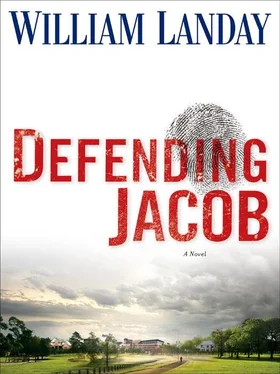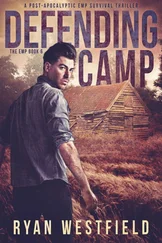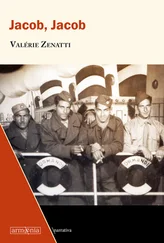William Landay - Defending Jacob
Здесь есть возможность читать онлайн «William Landay - Defending Jacob» весь текст электронной книги совершенно бесплатно (целиком полную версию без сокращений). В некоторых случаях можно слушать аудио, скачать через торрент в формате fb2 и присутствует краткое содержание. Жанр: Криминальный детектив, на английском языке. Описание произведения, (предисловие) а так же отзывы посетителей доступны на портале библиотеки ЛибКат.
- Название:Defending Jacob
- Автор:
- Жанр:
- Год:неизвестен
- ISBN:нет данных
- Рейтинг книги:2.33 / 5. Голосов: 3
-
Избранное:Добавить в избранное
- Отзывы:
-
Ваша оценка:
- 40
- 1
- 2
- 3
- 4
- 5
Defending Jacob: краткое содержание, описание и аннотация
Предлагаем к чтению аннотацию, описание, краткое содержание или предисловие (зависит от того, что написал сам автор книги «Defending Jacob»). Если вы не нашли необходимую информацию о книге — напишите в комментариях, мы постараемся отыскать её.
Defending Jacob — читать онлайн бесплатно полную книгу (весь текст) целиком
Ниже представлен текст книги, разбитый по страницам. Система сохранения места последней прочитанной страницы, позволяет с удобством читать онлайн бесплатно книгу «Defending Jacob», без необходимости каждый раз заново искать на чём Вы остановились. Поставьте закладку, и сможете в любой момент перейти на страницу, на которой закончили чтение.
Интервал:
Закладка:
3
Early the next morning there was a voice in the dark, in Jacob’s room, a groan-and I woke up to find my body already moving, swinging up onto its feet, shuffling around the foot of the bed. Still dense with sleep, I passed out of the gloom of the bedroom, through the gray light of dawn in the hallway, then back into darkness again in my son’s bedroom.
I turned on the wall switch and adjusted the dimmer. Jacob’s room was cluttered with huge oafish sneakers, a MacBook covered with stickers, an iPod, schoolbooks, paperback novels, shoe boxes filled with old baseball cards and comic books. In a corner, an Xbox was hooked up to an old TV. The Xbox disks and their cases were piled nearby, mostly combat role-play games. There was dirty laundry, of course, but also two stacks of clean laundry neatly folded and delivered by Laurie, which Jacob had declined to put away in his bureau because it was easier to pluck clean clothes right from the piles. On top of a low bookcase was a group of trophies Jacob had won when he was a kid playing youth soccer. He had not been much of an athlete, but back then every kid got a trophy, and in the years since he had simply never moved them. The little statues sat there like religious relics, ignored, virtually invisible to him. There was a vintage movie poster for a 1970s chop-socky picture, Five Fingers of Death, which featured a man in a karate outfit smashing his well-manicured fist through a brick wall. (“The Martial Arts Masterpiece! SEE one incredible onslaught after another! PALE before the forbidden ritual of the steel palm! CHEER the young warrior who alone takes on the evil war-lords of martial arts!”) The clutter in here was so deep and permanent, Laurie and I had long since stopped fighting with Jacob to clean it up. For that matter, we had stopped even noticing it. Laurie had a theory that the mess was a projection of Jacob’s inner life-that stepping into his bedroom was like stepping into his chaotic teenage mind-so it was silly to nag him about it. Believe me, this is what you get when you marry a shrink’s daughter. To me, it was just a messy room and it drove me crazy every time I came into it.
Jacob lay on his side at the edge of his bed, not moving. His head was arched back and his mouth hung open, like a howling wolf. He was not snoring but his breathing had a clotted sound; he had been fighting a little cold. Between sliffy breaths, he whimpered, “N-, n-”: No, no.
“Jacob,” I whispered. I reached out to soothe his head. “Jake!”
He cried again. His eyes fluttered behind the eyelids.
Outside, a trolley clattered by, the first train into Boston on the Riverside line, which passed every morning at 6:05.
“It’s just a dream,” I told him.
I felt a little gush of pleasure at comforting my son this way. The situation triggered one of those nostalgic pangs that parents are subject to, a dim memory of Jake as a three- or four-year-old boy when we had a bedtime routine: I would ask, “Who loves Jacob?” and he would answer, “Daddy does.” It was the last thing we said to each other before he went to sleep each night. But Jake never needed reassuring. It never occurred to him that daddies might disappear, not his daddy at any rate. It was me that needed our little call-and-response. When I was a kid, my father was not around. I barely knew him. So I resolved that my own children would never feel that; they would never know what it is to be fatherless. How strange that in just a few years Jake would leave me. He would go off to college, and my time as an everyday, active-duty father would be over. I would see him less and less, eventually our relationship would wither to a few visits a year on holidays and summer weekends. I could not quite imagine it. What was I if not Jacob’s father?
Then another thought, unavoidable in the circumstances: no doubt Dan Rifkin meant to keep his son from harm too, no less than I did, and no doubt he was as unprepared as I was to say good-bye to his son. But Ben Rifkin lay in a refrigerated drawer in the M.E.’s office while my son lay in his warm bed, with nothing but luck to separate the one from the other. I am ashamed to admit that I thought, Thank God. Thank God it was his kid that got taken, not mine. I did not think I could survive the loss.
I knelt beside the bed and circled my arms around Jacob and laid my head on his. I remembered again: when he was a little kid, the moment he woke up every morning Jake used to pad sleepily across the hall to our bed to snuggle. Now, under my arms he was impossibly big and bony and coltish. Handsome, with dark curly hair and a ruddy complexion. He was fourteen. Certainly he would never allow me to hold him this way if he was awake. In the last few years he had become a little surly and reclusive and a pain in the ass. At times it was like having a stranger living in the house-a vaguely hostile stranger. Typical adolescent behavior, Laurie said. He was trying out different personas, getting ready to leave childhood behind for good.
I was surprised when my touch actually settled Jacob down, stopped whatever bad dream he had been having. He drew in a single deep breath and rolled over. His breathing relaxed into a comfortable stride, and he settled into a deep sleep, deeper than I was capable of. (At fifty-one years old, I seemed to have forgotten how to sleep. I woke up several times a night and rarely got more than four or five hours of sleep.) It pleased me to think I had soothed him, but who knows? Maybe he did not even know I was there.
That morning the three of us were all skittish. The reopening of the McCormick School just five days after the murder had us all a little rattled. We followed our normal routine-showers, coffee and bagels, glance at the Net for email and sports scores and news-but we were tense and awkward. We were all up by six-thirty but we dawdled and found ourselves running late, which only added to the anxiety.
Laurie in particular was nervous. She was not only afraid for Jacob, I think. She was unnerved by the murder, still, as healthy people are surprised when they become seriously ill for the first time. You might expect that living with a prosecutor all those years would have prepared Laurie better than her neighbors. She ought to have known by then that-though I was hard-hearted and tone-deaf to point it out the night before-life does go on. Even the wettest violence, in the end, is cooked down to the stuff of court cases: a ream of paper, a few exhibits, a dozen sweating and stammering witnesses. The world looks away, and why not? People die, some by violence-it is tragic, yes, but at some point it ceases to be shocking, at least to an old prosecutor. Laurie had seen the cycle many times, watching over my shoulder, yet she was still thrown by the irruption of violence in her own life. It showed in her every movement, in the arthritic way she held herself, in the subdued tone of her voice. She was working to maintain her composure and not having an easy time of it.
Jacob stared into his MacBook and chewed his rubbery microwaved frozen bagel in silence. Laurie tried to draw him out, as she always does, but he was not having any of it.
“How are you feeling about going back, Jacob?”
“I don’t know.”
“Are you nervous? Worried? What?”
“I don’t know.”
“How can you not know? Who else would know?”
“Mom, I don’t feel like talking now.”
This was the polite phrase we had instructed him to use instead of just ignoring his parents. But by this point he had repeated “I don’t feel like talking now” so often and so robotically, the politeness had drained out of it.
“Jacob, can you just tell me if you’re feeling all right so I don’t have to worry?”
“I just said. I don’t feel like talking.”
Читать дальшеИнтервал:
Закладка:
Похожие книги на «Defending Jacob»
Представляем Вашему вниманию похожие книги на «Defending Jacob» списком для выбора. Мы отобрали схожую по названию и смыслу литературу в надежде предоставить читателям больше вариантов отыскать новые, интересные, ещё непрочитанные произведения.
Обсуждение, отзывы о книге «Defending Jacob» и просто собственные мнения читателей. Оставьте ваши комментарии, напишите, что Вы думаете о произведении, его смысле или главных героях. Укажите что конкретно понравилось, а что нет, и почему Вы так считаете.












